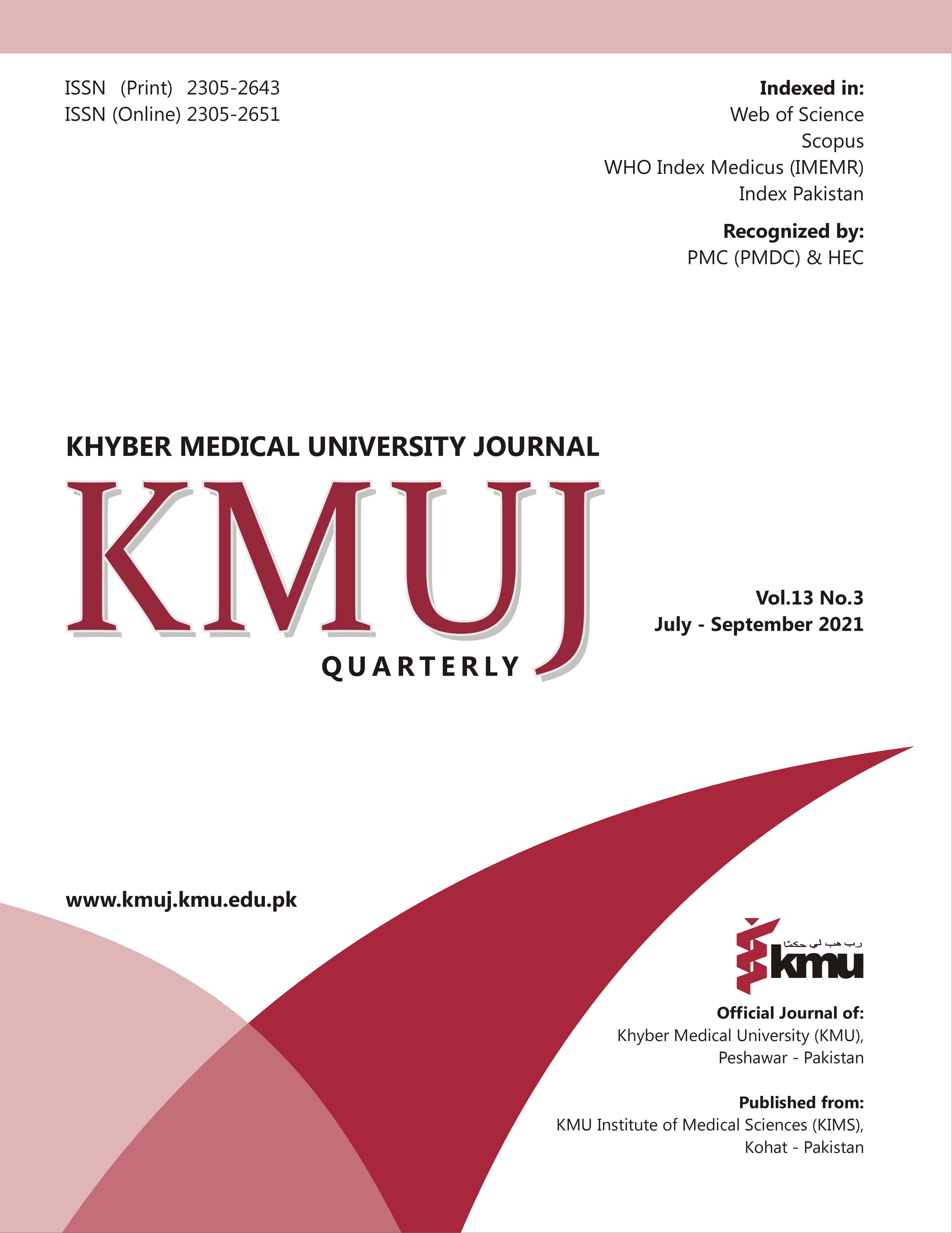RELATION BETWEEN MATERNAL QUALITY OF LIFE WITH MOTOR FUNCTIONING OF CEREBRAL PALSY CHILDREN AFTER PHYSIOTHERAPY REHABILITATION
Main Article Content
Abstract
OBJECTIVE: To find the relationship between quality of life of mothers of cerebral palsy children and child's motor functioning after at least 3 months of rehabilitation.
METHODS: This cross-sectional study was conducted at Liaquat National Hospital, Karachi, Pakistan from August to November 2019. Total 35 cerebral palsy (CP) children and their mothers were involved. Assessment of mother’s health done through Medical Outcomes Study Questionnaire Short Form 36 Health Survey (SF-36) and children's motor functioning through Gross Motor Function Measure (GMFM-88).
RESULTS: While comparing the results of SF-36 in GMFM-88, we found that children’s mothers with low GMFM score had a general health deterioration compared to children with higher GMFM score. Mothers who are having a child with cerebral palsy, with GMFM between 1-80 had to cut down the amount of time spend on work while mothers whose child’s GMFM was between 1-20 were limited in kind of work and other activities as well as they accomplished less than she would like, and they didn’t do their work as carefully as usual. Due to low GMFM (1-20) of kids’ mothers even suffered from moderate level of body ache. Likewise, in children’s mothers with lower GMFM ratings (1-20 & 21-40) have disturbed work intervention due to affected physical and emotional health. Similarly, social interaction has also been affected.
CONCLUSION: This study illustrates that mother of cerebral palsy patient deal with severe physical and mental fatigue. While paying attention only to children’s issues, the health of caregiver mothers also needs special considerations.
Article Details
Work published in KMUJ is licensed under a
Creative Commons Attribution 4.0 License
Authors are permitted and encouraged to post their work online (e.g., in institutional repositories or on their website) prior to and during the submission process, as it can lead to productive exchanges, as well as earlier and greater citation of published work.
(e.g., in institutional repositories or on their website) prior to and during the submission process, as it can lead to productive exchanges, as well as earlier and greater citation of published work.
References
Raina P, O'Donnell M, Rosenbaum P, Brehaut J, Walter SD, Russell D, et al. The health and well-being of caregivers of children with cerebral palsy. Pediatrics 2005 Jun 1;115(6):e626-36. https://doi.org/10.1542/peds.2004-1689.
What is child development? South Australia2019. [Accessed on: February 21, 2020]. Available from URL: https://childdevelopment.com.au/areas-of-concern/what-is-child-development/
Poinsett PM. Cerebral palsy facts and statistics. 2019 October 06, 2019. [Accessed on: February 21, 2020]. Available from URL: https://www.cerebralpalsyguidance.com/cerebral-palsy/research/facts-and-statistics/
Kumar R, Lakhair MA, Lakhair MA. Frequency and severity of depression in mothers of cerebral palsy children. J Liaquat Uni Med Health Sci 2016;15(3):147-51.
Condliffe EG, Jeffery DT, Emery DJ, Gorassini MA. Spinal inhibition and motor function in adults with spastic cerebral palsy. J Physiol 2016;594(10):2691-2705. https://doi.org/10.1113/JP271886.
Herskind A, Ritterband-Rosenbaum A, Willerslev-Olsen M, Lorentzen J, Hanson L, Lichtwirk G, et al. Muscle growth is reduced in 15-month-old children with cerebralpalsy. Dev Med Child Neurol 2016;58(5):485-91. https://doi.org/10.1111/dmcn.12950.
Monbaliu E, Himmelmann K, Lin JP, Ortibus E, Bonouvrié L, Feys H, et al. Clinical presentation and management of dyskinetic cerebral palsy. Lancet Neurol 2017 Sep 1;16(9):741-9. https://doi.org/10.1016/S1474-4422(17)30252-1
Ataxic Cerebral Palsy. Cerebral palsy group; 2016-2020. [Accessed on: February 21, 2020]. Available from URL: https://cerebralpalsygroup.com/cerebral-palsy/ataxic/#targetText=Ataxic%20cerebral%20palsy%20is%20a,is%20the%20least%20diagnosed%20type
Davis E, Shelly A, Waters E, Boyd R, Cook K, Davern M, et al. The impact of caring for a child with cerebral palsy: quality of life for mothers and fathers. Child Care Health Dev 2010;36(1):63-73. https://doi.org/10.1111/j.1365-2214.2009.00989.x
Singogo C,Mweshi M, Rhoda A. Challenges experienced by mothers caring for children with cerebral palsy in Zambia. S Afr J Physiother 2015;71(1):274. https://doi.org/10.4102/sajp.v71i1.274.
Ahmadizadeh Z, Mokhlesin M. Factors which affect the depression of mothers with cerebral palsy child. Iran Rehab J 2014;12(4):43-8.
Sajedi F,Alizad V, Malekkhosravi G, Karimlou M, Vameghi R. Depression in mothers of children with cerebral palsy and its relation to severity and type of cerebral palsy. Acta Med Iran 2010;48(4):250-4.
Garip Y, Ozgul S, Tuncer OB,Kilinc G, Seckin f, Arasil T. Fatigue in the mothers of children with cerebral palsy. J Disab Rehab 2017;39(8):757-62. https://doi.org/10.3109/09638288.2016.1161837
Lee MH, Mathews AK, Park C. Determinants of Health-related Quality of Life Among Mothers of Children With Cerebral Palsy. J Pediatr Nurs 2019;44:1-8. https://doi.org/10.1016/j.pedn.2018.10.001
Terzi R, Tan G. Musculoskeletal system pain and related factors in mothers of children with cerebral palsy. Agri. 2016 Jan 1;28(1):18-24. https://doi.org/10.5505/agri.2015.74436.
